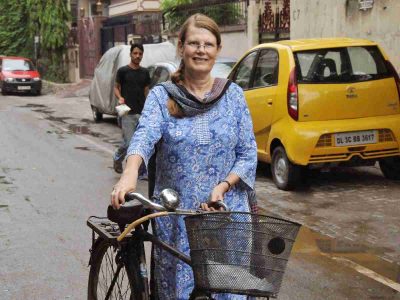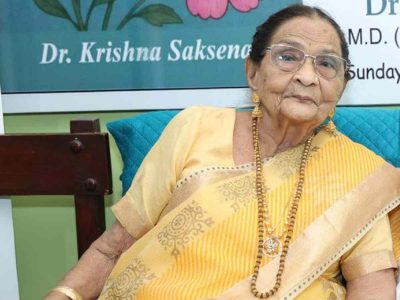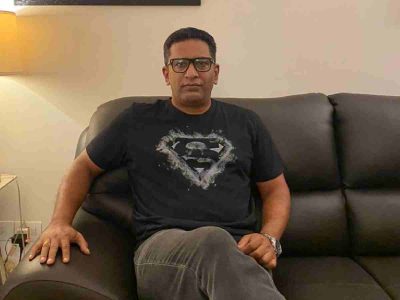Ranjit Grewal is a young resident of Sainik Farms who seeks a lasting solution to the traffic woes — a solution that includes the poor people living in adjoining areas
Ranjit Grewal is a 33-year-old resident of Sainik Farms, a civil engineer by training. He wears many hats as he works on a host of business ventures in India and across the world. He has spent most of his formative years in California.
Hailing from an affluent family of agriculturists from Meerut, he lives in the house his father built in Sainik Farms some 30 years ago, when it was “all jungle.” Quite a contrast to what it has become now: a maze of roads that connect a conclave of big bungalows nestled in seraphic greenery where the Delhi’s glitterati lives. His neighbours are a former chief minister, a former police commissioner, a former diplomat, industrialists and Delhi’s influential upper crust.
Grewal is well connected and has friends in the fashion industry, film, corporate sector, politicians and babus.
What bothers him the most is that Sainik Farms is one of 1,797 urban clusters in Delhi that’s designated as an ‘unauthorised colony’. Its residents have gas connections, official power and water supply and street lights. For all practical purposes, living here is regularised and therefore should be ‘authorised’.
When it comes to facilites, only the narrow roads remain a matter of concern as traffic flow during the busy hours is very slow. Grewal is committed to change this in a way that’s equitable and sustainable. He has taken the onus on himself and has been talking to all the stakeholders.
It’s ironic that one of the poshest localities in Delhi where industrialists, diplomats, bureaucrats, lawyers and senior police officials live in style is ‘unauthorised’ and is surrounded by one of the poorest urban clusters in the city, also called Lal Dora, namely Sangam Vihar, Devli Goan and Raju Park to name a few. These too are ‘unauthorised’. They have no separate and viable access to their clusters, so they enter via Sainik Farms.
According to locals, 90% of the traffic in Sainik Farms is using it as a thoroughfare. Though both the state and union governments have made commitments in the past, Bhutani, a former president of Sainik Farm RWA, feels, “This has been continuing for many years and looks like will go on for some time.”
“They (the residents of adjoining urban clusters) use our roads, which are in a much better condition,” says Ramesh Dugar, president of Sainik Farm’s RWA and convenor of Area Development Committee. He explains that the situation has become very bad and blames it on the failure of the government to implement its own plan since 2007. It was proposed to construct roads that would connect Sangam Vihar to Chhattarpur and another that would connect Gate No. of Sainik Farms to Bandha Road.
Sainiks Farm is a good example of how bad politics hinders the life of people, even the privileged lot. Dugar informs that though the Kejriwal government is “interested” in bringing change and has petitioned the Union government for the regularisation of unauthorised colonies, the latter has “not responded.” State Assembly elections being around the corner, the regularisation of colonies is a burning issue but the two parties are wary of the other taking credit.
With no help from any government forthcoming, the Sainik Farms RWA has erected many gates to regulate the traffic of non-residents —which has had the effect of gentrification. Many of the locals’ complain that it’s actually counterproductive, as it contributes to traffic snarls. The local police are of the view that only 20 of these gates were permitted by the court to regulate the flow of “construction material” and not people at large. Traffic flow has become a serious concern for the residents of Sainik Farm.
Dugar doesn’t agree with police’s position, as the police station itself is an illegal structure. He claims. “The police station is built on a plot of land meant to part of the road. It used to be a 100-sq ft structure which now has expanded into a 1,000-yard premises. And it was built at a time when construction was banned in Sainik Farms,” Dugar minces no words.
A sizeable part of the Sainik Farms RWA is not convinced about Dugar initiatives — like the laying of underground electric cables by BSES Rajdhani, which has added to traffic congestion. Last month, a resident approached the Delhi court but the court refused to stop the cable laying work.
Grewal feels that a solution “will only be viable if it takes care of the needs of all concerned,” including the residents of adjoining urban villages. They, Grewal explains, provide services of domestic help, driving and gardening, and are integral to the proper functioning of households in Sainik Farms. Grewal, as the Gen Next, wants to be part of the solution and not sit back and watch the impasse that has become the order of the day.
“The need of the hour is to look at the larger picture,” he feels. And the larger picture is that unless the adjoining villages are given connecting roads and have direct access, the problem will persist — even become worse in the times to come. He’s not in favour of erecting barriers like gates.
A pragmatic man with a kind heart, Grewal runs many offices in India and abroad. He likes working from home. He wears a relaxed look as he goes about his business with calm precision. He spends a part of his time taking care of his animals — stray cats and dogs, more than 300 of them. “I’m in touch with various NGOs and make sure medical attention is given to injured animals They don’t have a voice and suffer in silence,” he says.
After the treatment, he rehabilitates the animals in the streets where they lived. “For them, the street is like home. If are relocated to some other place, they’d be hounded out by other dogs,” he says, explaining the territorial nature of dogs. He bats for the weak who cannot speak up against injustices.
It’s no surprise that he’s for an inclusive solution. This has led to some heated debates within the RWA. Bhutani, former president of the Sainik Farms RWA, is of the view that’s consistent with that of Grewal, feels that regularisation of colonies requires “an outlet to leave and enter their locality” and because of “politics and passiveness people are climbing on each other for space.”
Grewal grew up in the US where the dignity of labour is part of the culture. He has problems with the prevailing attitude of looking down on the poor. He doesn’t like the way people treat their domestic help, drivers and gardeners. This attitude has compounded the problems at Sainik Farms and, therefore, not much has happened in so many years. But this has to change — and the change starts, like charity, at your own doorstep.





